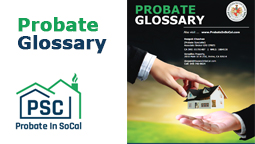This is a common question for those that may have properties or estates cumulatively under $166,250. May settle smaller estates with assets worth less than $166,250 without formal probate proceedings. You might consider using simple transfer procedures. This works for real property and personal property as long as there are no pending proceedings for the decedent’s estate and the gross value of all real and personal property is no more than $166,250. This figure is the value of the property and does not count any money on the property.
There are three separate procedures for these types of estates. One procedure is for property not exceeding $20,000 in value, and the other is for personal property or real property not exceeding $166,250 in value. The third is for personal property only.
If the estate or property qualifies, those entitled to inherit the property will obtain the estate’s title and possession with the proper procedures. The procedure for property under $20,000 must be an affidavit filed with the probate court after a six-month waiting period. Property-between $20,000 and $166,250 must be positioned with probate court after a 40 day waiting period.
This is for only property in the state of California. It does not include joint tenancy property, property outside the state of California, or property passing to a surviving spouse or registered domestic partner. There are several other exclusions as well, so it’s best to check with your probate attorney specialist Probate on eligibility.
If the property does not exceed $20,000 in value, it may not file the affidavit until six months after the decedent’s death. No probate proceedings may be pending or have been conducted in California for the property. Must include a legal description of the property and a signature of the person signing the affidavit, and it must be notarized. Must pay funeral expenses, any medical expenses, and unsecured debts before the affidavit is filed. A certified copy of the death certificate and a copy of the will must be attached to the affidavit. An appraisal buyer probate referee must be attached as well, showing the value of the real property.
The property between $20,000 and $166,250 has similar requirements. Still, any errors or beneficiaries must file a printed form petition with the Superior Court asking for an order determining the right to take the property without probate proceedings. Differences include that there must be 40 days after the decedent’s death, and no proceedings have been conducted in California for this estate.
The beneficiary or heir must prepare and file with the court a petition to determine succession to real property, a notice of hearing, a certification of assignment, filing fees, and the original will if it’s required. Other procedures include mailing the notice of hearing, filing the original notice of hearing, preparing the order determining succession to real property, filling the order, and checking calendar notes at the court. After the hearing, the beneficiary must file an order determining succession to real property, record a certified copy of the order in the county where it’s located, and filed a preliminary change of ownership report.
This can be very complicated, so it helps to have a real estate attorney professional walking you through the entire proceeding step-by-step. If you chose to have a different path and do all the work on your own, resources and support can be arranged; if you are open-minded about taking the responsibility, let’s connect.

